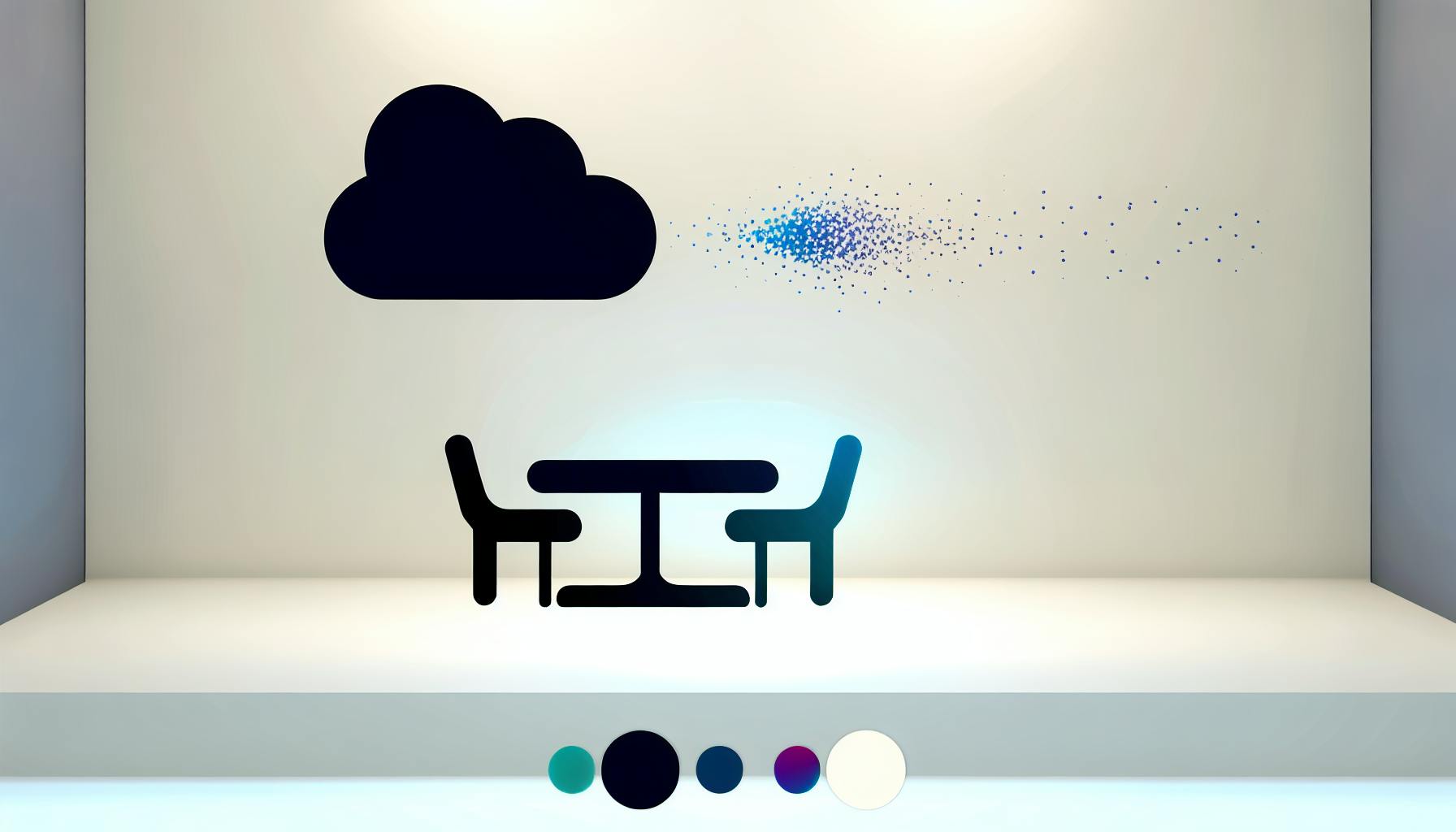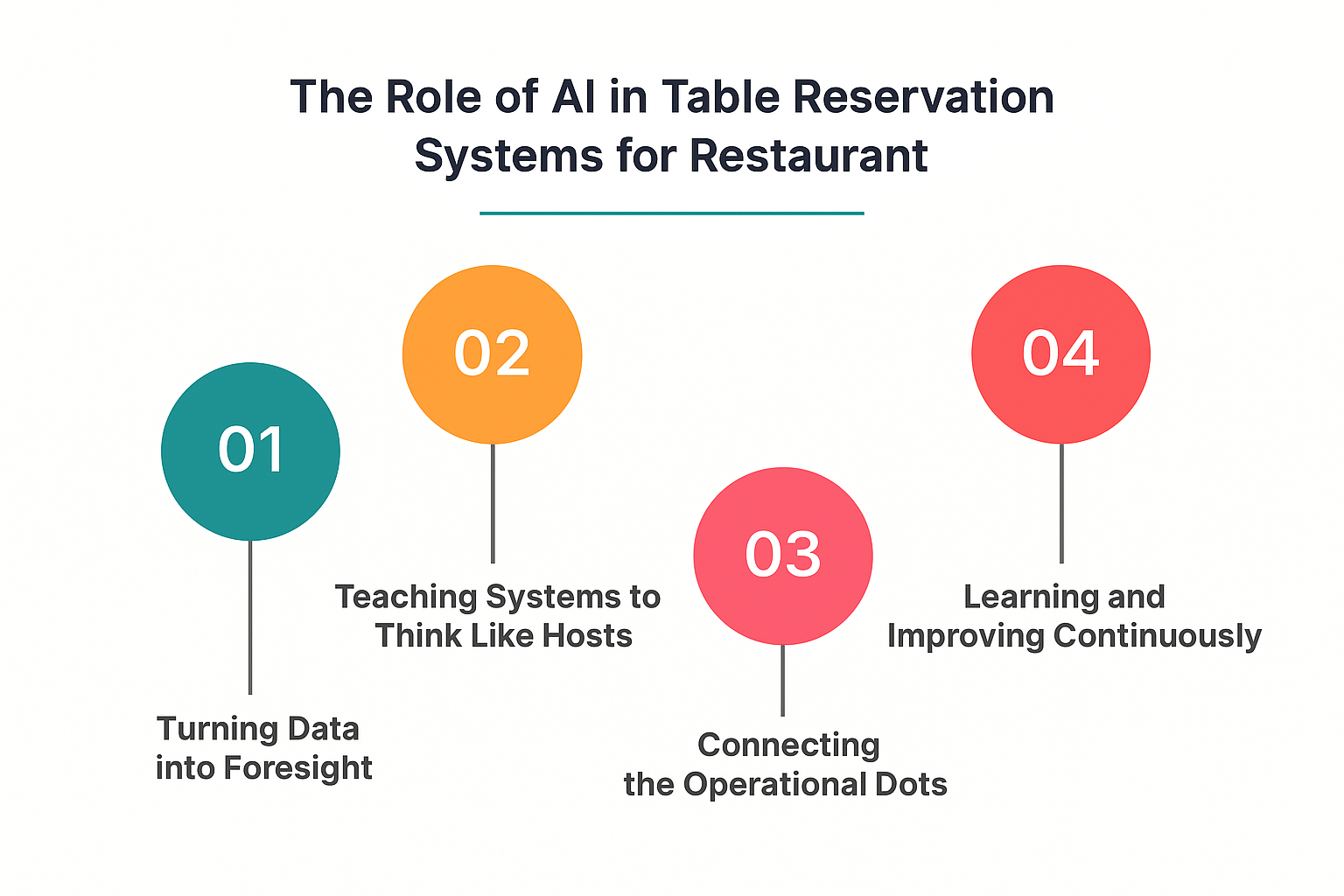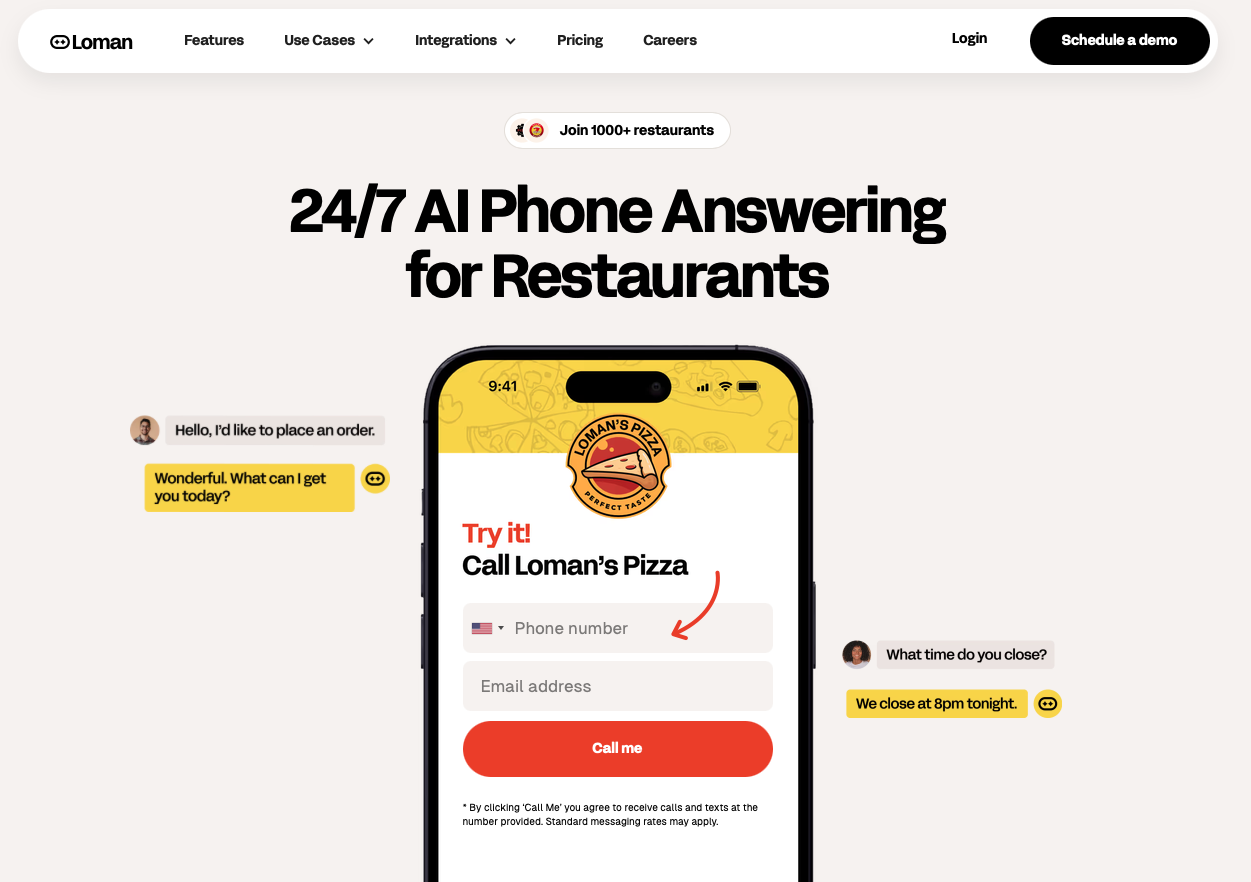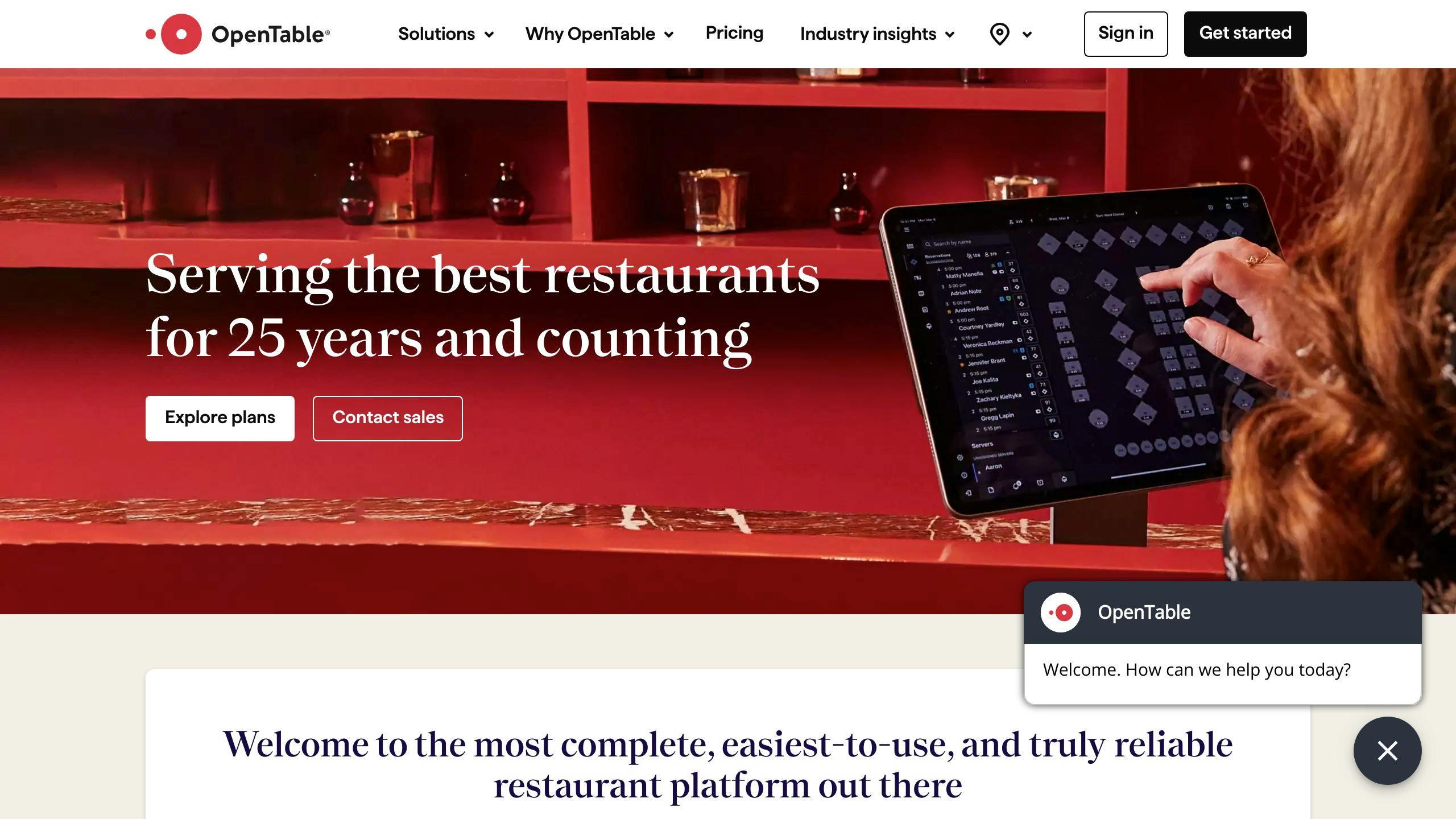November 17, 2025

AI-powered restaurant reservation systems are changing how we dine out, making it easier for both customers and restaurants. Here's a quick overview:
For Customers: You can book tables anytime, see real-time availability, get personalized suggestions, and enjoy quicker seating.
For Restaurants: These systems automate bookings, optimize table usage, improve customer satisfaction, and provide valuable insights for better decision-making.
Key Technologies: Include language model processing, predictive analytics, machine learning, and knowledge graphs.
Benefits: More efficient operations, higher revenue, personalized customer experiences, and easier table management.
Future Trends: Expect even smarter AI that offers hyper-personalization, better predictive analytics, and an easier system integration.
AI is all about creating a better dining experience by understanding customer preferences and managing restaurant resources smartly.
TL;DR:
AI reservation systems sync with POS and floor plans to show real-time table status
Restaurants see 20% more covers and 15% revenue gains by automating table allocation
Systems use predictive analytics to forecast busy periods and optimize staffing
Loman AI answers calls 24/7, takes reservations, and syncs directly with OpenTable
An AI reservation system is a smart program that helps restaurants manage table bookings automatically. It uses artificial intelligence to make the booking process smooth for both the restaurant and the customer. Customers can easily book a table using simple chat messages, and the system understands and processes their requests on its own.
This system keeps an up-to-date list of which tables are free and when. When someone books a table, the system automatically picks the best table based on how busy the restaurant is expected to be. Restaurants can make sure they have enough tables and staff ready for their guests.

Conversational AI: You can book a table just by chatting, like you would with a friend, through voice or messaging apps. No need to fill out long forms.
Real-time availability: Shows you which tables are free right now, so you can pick the one you like. This info is always up to date.
Automated table allocation: The system decides where to seat you based on how many people are coming and what tables are available. It’s all done automatically.
Integration with restaurant tech stack: This booking system can work together with other restaurant programs, like those for payments and inventory, to share information smoothly.
Analytics and business intelligence: The system studies how customers book tables and uses this info to make things better for both the restaurant and its guests.
A few key technologies make AI reservation systems work:
Language model processing helps the system understand and respond to what you say or type in a natural way.
Predictive analytics guesses how busy the restaurant will be, helping to manage table availability better.
Machine learning learns from past bookings to make smarter decisions about where to seat customers.
Knowledge graphs help the system understand the relationship between different things, like which tables are best for certain situations.
Together, these technologies help restaurants offer a better booking experience, making sure tables are used efficiently and guests are happy.
AI-powered reservation systems are really helpful for both restaurants and people who want to eat out.
Using an AI reservation system makes things easier for restaurants in several ways:
It takes care of booking tables automatically, which means staff have more time to make sure customers are happy.
It helps figure out the best way to use tables and when to expect more people, so everything runs smoothly.
It offers useful tips based on what's been happening in the restaurant, helping to plan better.
It can adjust prices or offer special deals when it knows there will be more or fewer customers.
It works well with other systems in the restaurant, like those for paying or keeping track of stock.
In short, AI reservation systems help restaurants use their space better, work more efficiently, and make smarter choices to earn more money.
For people who want to eat out, AI reservation systems make things more convenient:
You can book a table any time you want, even if the restaurant is closed.
You can see which tables are available right now and how long you might have to wait.
It suggests places you might like based on where you've eaten before.
If you need to change or cancel your booking, you can do it easily yourself.
It helps reduce the time you have to wait to be seated.
Every time you book, the process is quick and easy.
By making it easier to book a table and offering a more personalized service, AI systems make going out to eat a better experience.
Overall, AI-powered reservations are changing the way restaurants work and how we enjoy eating out. They make everything more efficient and tailored to what customers and restaurants need.
Restaurants need to know which tables are free right now to make sure everyone has a great time. AI reservation systems help by using smart tools to decide where to seat people based on who's coming and when.
AI reservation systems look at past data, like how big groups are and how long they stay, to guess how busy the restaurant will be. They can also figure out the best place to seat different groups by considering things like how close they want to be to the kitchen. This helps restaurants be ready for both expected and surprise guests.
Predictive analytics: The system looks at old data to guess how busy things will get. It helps plan for the right number of guests.
Constraint programming: This is a fancy way of saying the system can pick the best table for you, thinking about how many people you're with and where you'd like to sit, all while making sure the restaurant can serve everyone well.
Real-time optimization: This keeps everything running smoothly as plans change. It makes sure guests are happy and tables are filled efficiently.
When the AI reservation system works together with a digital map of the restaurant, staff can see which tables are free or taken at a glance. This helps with:
Making sure the staff knows the current status of tables through a digital floor plan.
Adjusting on the fly to welcome walk-ins by looking at which tables are actually free.
Keeping track of when tables are ready or when guests are done, making everything run like clockwork.
By using AI to manage tables in real time and keeping everything connected, restaurants can give a better, more personal service. It's the new way to make sure guests leave happy.
Restaurants using AI for booking tables have seen big improvements. Here are some stories of places that got better with this tech.
This family-run Italian place had trouble getting people seated and out the door quickly during busy times. After they started using an AI system called Loman AI, they were able to seat 20% more people and make 15% more money in just three months.
The system looks at old data to guess how busy they'll be. It helps plan how many people to have working and how to arrange tables ahead of time. It also gives tips on how to fit in more walk-in customers.
"Loman helps us handle more guests without dropping the ball on service or making the visit less nice," Marco, the owner, said. "Our team keeps everything running smoothly, even when it's really busy."
Tokyo Kitchen got better reviews, going from 3.2 to 4.7 stars, after using Loman AI because of complaints about long waits. The system tells guests how long they'll have to wait, based on live table info. This honesty helped calm down frustrated customers. Plus, it's good at guessing when tables will free up, so there are fewer mistakes in wait times.
"Before, it was tough to manage how long people expected to wait," says Emi, the manager. "Now, guests know what's coming, and we can keep our word."
This busy cafe needed to get orders right and out fast, especially during the morning rush. Mistakes and delays were common.
After they got Loman AI's chat system, they made 30% fewer mistakes with orders. The chatbot takes complex orders perfectly, letting the staff focus on making food and helping customers.
The chatbot also talks to the kitchen system to make sure food is ready on time. So, orders are now 40% faster on average.
"Loman lets us chat with customers without slowing down or messing up," the cafe's owner mentioned. "We're serving orders faster than ever while still making them special for each person."
These stories show that AI can really help restaurants do better, earn more, and make customers happier. As this tech gets even better, more places will likely start using it to keep up.
Bringing in new tech can be tough, but AI reservation systems are worth the effort for restaurants ready to get started. Here are some usual hurdles restaurants face when starting with these systems, and how to tackle them.
Sometimes it's hard to get everyone on board with new AI reservation systems. But having support from the top can help a lot. Restaurant owners should:
Explain the benefits like making more money and happier customers. An AI system can show its value with real numbers.
Share success stories from other restaurants that are doing well with AI to inspire your team.
Talk to department leaders early so they feel part of the plan.
Provide training so staff see how AI makes their work easier, not harder. This helps everyone support the change.
Old tech can make it hard to bring in new AI systems. Here are some ways to make it easier:
Check if new and old systems work together before picking an AI system. Look for ones that easily connect with what you already have.
Start slow with new features, turning them on one at a time.
Use special software to help old and new systems work together.
Plan for small updates to old systems to help them connect with the new AI.
To avoid a messy start, restaurants need good planning. Here's how:
Set clear goals and ways to check progress from the start.
Pick someone from your team to lead the project and talk with the AI company.
Write down steps for setting up and teaching staff about the new system.
Test everything before you start using it with customers, and fix any problems quickly.
Ask for feedback from users to keep making the system better.
With the right prep and everyone on board, restaurants can get past the usual bumps of starting with AI. It's all about planning and taking steps one at a time.
AI technology is getting better and will keep making the way we book restaurants even easier and smarter. Here's what to look forward to:
AI will get even better at understanding what we say in a normal way. So, if you want to book a table and say something like "I want a quiet spot for two" or "I’d love to see the sunset from my table," the system will know exactly what you mean.
Booking systems will connect more closely with other restaurant tools like cash registers, stock lists, and staff schedules. The AI can know more about you and make your visit even more special.
The more you use these systems, the more they learn about what you like. They'll start to suggest your favorite foods or drinks and maybe even offer you special deals that are just right for you when you book a table.
AI will use data from past bookings, the weather, and local events to better guess how busy a restaurant will be. This helps restaurants be ready with the right number of staff and enough food, making sure everyone gets a great experience.
As AI gets smarter, booking a table will become quicker and more personal. You'll get suggestions that fit just what you like, and restaurants will run smoother. It's a win-win for everyone who loves eating out.

Loman AI is a smart tool that helps restaurants manage their bookings through conversations. It uses AI, which is like teaching a computer to understand and talk like a human, to handle booking a table from start to finish. Customers can easily book a table anytime without waiting, and restaurants can focus on serving great food and experiences.
Using Loman AI helps restaurants in several ways:
Better Service for Customers: Loman lets customers book tables quickly and in a friendly way, any time of the day.
More Bookings: Loman can handle more bookings by quickly responding to customers, catching opportunities the restaurant might otherwise miss.
Focus on What Matters: With Loman taking care of bookings, restaurants can use their staff for providing great hospitality.
Smart Insights: Loman gives useful information about what customers like and how the restaurant is doing, helping to make smart decisions.
Loman uses advanced AI to talk just like a person:
Understanding Natural Language: It can understand when people talk or type in their own words.
Keeping Track of Conversations: Loman remembers what was said before, so conversations make sense.
Connecting the Dots: It uses what it knows to make good suggestions and help out.
Making Up Responses: Loman can come up with answers right away that sound natural.
Speaking Like a Human: It talks in a way that sounds real and friendly.
Loman keeps getting smarter, learning more about what guests like and how to make bookings better.
Loman works well with the systems restaurants already use:
Websites for booking tables
Systems for managing tables and orders
Customer records
Tools for sending out marketing messages
It can share information both ways, making sure it knows the latest about table availability and customer preferences.
Restaurants that use Loman see big improvements:
A lot more online bookings
More bookings when it's busiest
Faster table turnover, so they can serve more customers
Bigger groups coming in
More customers overall in a night
Loman also helps restaurants understand their busiest times, what customers ask for most, who's coming in, and more. This allows them to make decisions based on real data.
By using Loman AI, restaurants can make booking a table easy and improve how they operate, all while keeping customers happy.
AI systems that help with booking tables are really changing how restaurants work by making the reservation process automatic and smarter. This tech is great for both people who want to eat out and the restaurants themselves.
For customers, AI booking systems offer:
The ability to book a table any time, day or night
A way to see which tables are free right now
Suggestions for places you might like based on your past choices
Quicker times to get seated
An easy way to change or cancel your booking
For restaurants, the perks include:
Running more smoothly
Using resources like tables and staff in the best way
Making customers happier
Getting more bookings and making more money
Learning what customers like
As AI gets better, booking a table at a restaurant will get even easier. We'll see more personalized suggestions, smarter guesses about busy times, and better teamwork between different systems in the restaurant.
AI is really making a difference in how we book tables at restaurants. It makes things automatic, keeps track of tables in real-time, and helps restaurants understand their customers better. By using AI restaurant reservation systems, restaurants can make sure their customers are happy while also making their own work easier. Looking ahead, restaurants that use AI to help with bookings are setting themselves up for a bright future.
OpenTable is a really popular app that helps you find and book tables at restaurants. It works with over 60,000 places to eat across the U.S. and in more than 30 countries. Here's what you can do with it:
Look for restaurants by where they are, what kind of food they serve, how good they are, and if they have open tables when you want to go
See which tables are free in real-time for the date, time, and number of people you have
Book a table anytime, day or night
Change your reservation if you need to, like the time, date, or how many people are coming
Get points for every booking you make
OpenTable makes it super easy to book a place to eat, helping both diners and restaurants.

Yes, OpenTable has a chatbot for Facebook Messenger. This bot lets you:
Find restaurants in a certain area that fit what you're looking for, like the type of food, price range, and ratings
Check table availability and book a spot right away without leaving Messenger
Change your booking details like how many people are coming, the date/time, or add special requests
The bot uses AI to understand what you're asking and makes booking a table just like having a quick chat.
OpenTable is at the top of software for booking tables and managing guests at restaurants. Its software lets restaurants:
Manage bookings in real-time, keeping the restaurant's system and the OpenTable site updated
Keep an eye on tables with a digital floor plan
Keep track of guests' likes, past orders, and special days
Look at data on booking trends, guest info, and business insights
Used by more than 60,000 restaurants worldwide, OpenTable helps places to eat run smoother, offer better service, and get more people coming back.
In restaurants, AI looks at data from customers to:
Better predict when it will be busy
Send marketing stuff and offers that fit what you like based on what you've bought before
Understand feedback to make the menu and experience better
Answer customer questions quickly with chatbots
Decide the best way to arrange seating
Keep track of stock and orders more efficiently
As AI gets better, it helps restaurants make more money, keep customers happier, and run more smoothly by making smart decisions based on data.

Enter your information in the form to receive a call from Loman and place an order like a customer would!